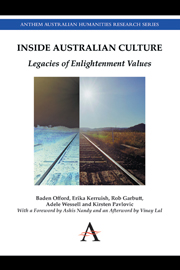Book contents
- Frontmatter
- Contents
- Foreword. Is Australia a Victim of the Ethical Limits of the Enlightenment? A Modest Foreword for an Immodest Venture
- Preface and Acknowledgements
- Chapter One Introduction
- Part One Getting Inside Australian Public Culture
- Chapter Two The Enlightenment and Tradition in Early Colonial Society
- Chapter Three Australian Values and Their Public Culture(s)
- Part Two Three Moments of the Enlightenment
- Part Three Working with the Necessary Other
- Afterword. The Emptiness Within and Without: Enlightenment Australia and Its Demons
- Notes
- Index
Chapter Two - The Enlightenment and Tradition in Early Colonial Society
from Part One - Getting Inside Australian Public Culture
Published online by Cambridge University Press: 05 October 2014
- Frontmatter
- Contents
- Foreword. Is Australia a Victim of the Ethical Limits of the Enlightenment? A Modest Foreword for an Immodest Venture
- Preface and Acknowledgements
- Chapter One Introduction
- Part One Getting Inside Australian Public Culture
- Chapter Two The Enlightenment and Tradition in Early Colonial Society
- Chapter Three Australian Values and Their Public Culture(s)
- Part Two Three Moments of the Enlightenment
- Part Three Working with the Necessary Other
- Afterword. The Emptiness Within and Without: Enlightenment Australia and Its Demons
- Notes
- Index
Summary
The Enlightenment vision also is a very, over the last two-and-a-half centuries, totalising posture because it thinks it is the last word in human history. It's as if Europe in the eighteenth century found the final answers to certain kinds of specific problems of human public life – and all that we can do now is to make minor editorial changes.
Interview with Ashis Nandy, 6 December 2007In Australia, as in many other parts of the world, ideas and practices that have come to be termed the Enlightenment shepherded in modernity and installed measures of value, frameworks for social decision making and yardsticks for public debate. The subject of our discussion below is the way in which Enlightenment ideas, often those from the British Enlightenment, came to form the terms and values of early New South Wales’ (NSW) public culture and social order, favouring some traditions while marginalising and suppressing others.
Enlightenment thought took shape in relationship to the traditions present in the colony, despite the difficulty much Enlightenment thought had in acknowledging other traditions as a condition of understanding and as valuable in their own right. The specific circumstances of Australian colonisation and the presence of both supporting and resistant traditions meant that the mainly British Enlightenment ideas in Australia took on specific characteristics.
- Type
- Chapter
- Information
- Inside Australian CultureLegacies of Enlightenment Values, pp. 15 - 32Publisher: Anthem PressPrint publication year: 2014

